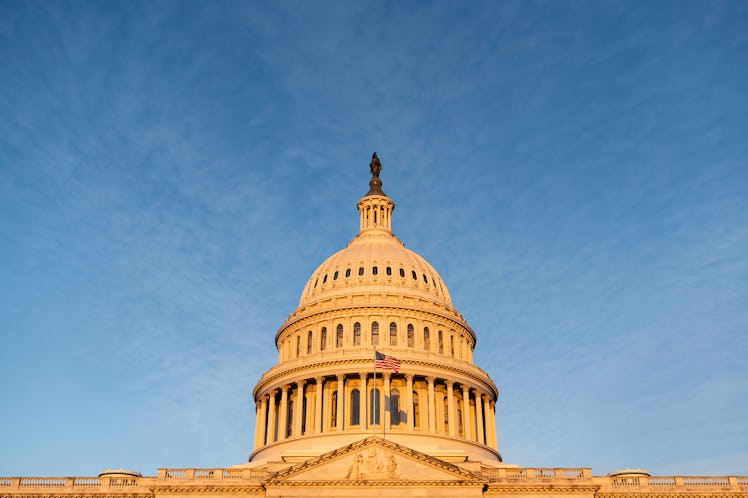
Here’s What It Would Take For The U.S. To Actually Declare War In The Ukraine Crisis
There are some technicalities.
The consequences of war are devastating for everyone involved, so in many countries, there are a number of checks and balances before a nation makes the choice to go into battle. But who has the authority to declare war in the United States? This is a little more complicated than you may think, so here’s a little overview on the responsibilities the president and Congress both have when it comes to declaring war.
In politics, conflict is inevitable. But while there are plenty of peaceful resolutions to de-escalate heated circumstances (negotiations, diplomacy, reparations) war is, unfortunately, sometimes unavoidable. Most recently, there’s been heated debate all over the country about whether or not the United States should assist Ukraine in its fight against Russia amid the ongoing invasion of Ukraine — but things are a lot more complicated than just taking up arms and gathering at the Ukrainian border. For one thing, not just anyone can declare war in the United States.
According to Article I, Section 8, Clause 11 of the Constitution, “[The Congress shall have Power . . . ] To declare War, grant Letters of Marque and Reprisal, and make Rules concerning Captures on Land and Water,” and to approve the necessary funding for it — because, let’s be real, war is expensive. But even getting that far can be difficult: To issue a formal declaration of war, a majority vote is needed from both the House and the Senate.
While only Congress has the authority to declare of war, the president can also play a huge role in conflict escalation as commander-in-chief of the nation’s armed forces. Under normal circumstances, the president will often appeal to Congress to declare a war. However, as the commander-in-chief, POTUS has the temporary authority to mobilize the military and the navy for up to 60 days in a state of emergency, as long as Congress is notified at least 48 hours before introducing troops to hostile situations.
Congress doesn’t necessarily have power to oppose the president under these circumstances, but what is does have is the power of the purse. If Congress doesn’t believe military engagement is in the best interest of the country, it has the power to cut funding for military support, which sounds a lot like a higher-stakes version of when you drive your mom’s car without her permission, so she stops sending you money for gas.
There are also several international laws the U.S. government must follow when it comes to declaring war. To point, under Article 51 of the Charter of the U.N., member nations (which include the United States) may only use military forces against another sovereign nation to defend itself against an imminent and unprovoked attack. And while it may use force in anticipation of such an attack, it can’t make any formal declarations of war based on potential threats. As a permanent member of the U.N. Security Council, the United States also has the power to declare war on another nation with the council’s approval. However, other permanent members — like China or Russia — could use their veto power to prevent the United States from moving forward.
Although the United States has been involved in plenty of military-heavy conflicts that weren’t necessarily called “wars” in the recent past, Congress has only declared war on 11 occasions, most recently in World War II. That’s probably for the best, as declaring war has a way of escalating conflicts to devastating consequences.